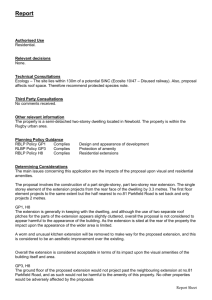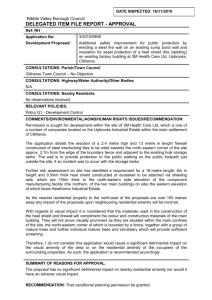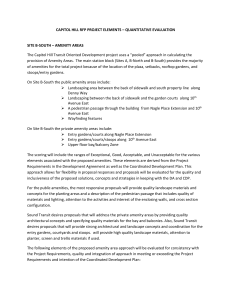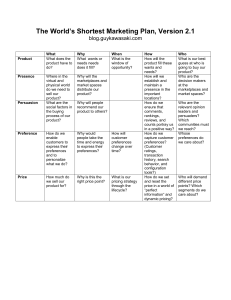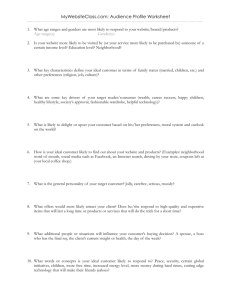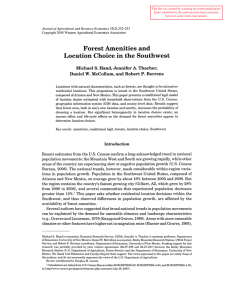Creating Livable Communities: A Place‐ Based Economic Development Strategy
advertisement
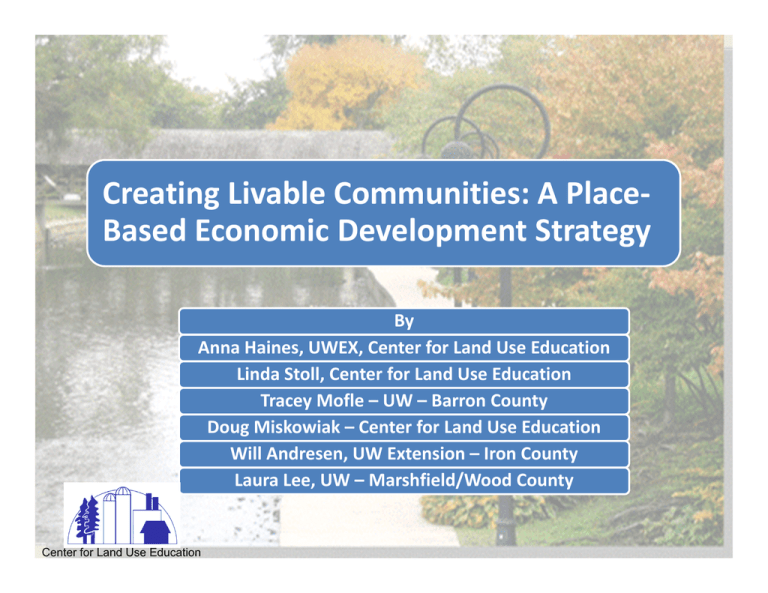
Creating Livable Communities: A Place‐ Based Economic Development Strategy By Anna Haines, UWEX, Center for Land Use Education Linda Stoll, Center for Land Use Education Tracey Mofle – UW – Barron County Doug Miskowiak – Center for Land Use Education Will Andresen, UW Extension – Iron County Laura Lee, UW – Marshfield/Wood County Center for Land Use Education Acknowledgements This project was funded by a grant from the UW Extension Program Innovation Fund and in‐kind services from UWSP – Center for Land Use Education, and UW Barron and Wood Counties Our Main Messages • Use an asset‐based community development approach of which economic development is one component • Focus on livability and quality of community • Create a resilient community The Situation in Wisconsin • Move to a global economy • Changes in manufacturing and agriculture = more technology, less labor • Fiscal challenges = loss of revenue and increased costs (schools, healthcare, etc) • Brain drain • Changes in U.S. demographics – retiring boomers, too few replacements More issues • Cost of transportation/peak oil • Global climate change – adapting to stronger storms • Obesity is increasing – children and adults = lowered life expectancy, increase in health care costs, loss of productivity Separate, but Equal Approaches? • Land use approach – Focus on land • Piecemeal • Lot by lot • Economic development approach – Focus on people and firms • Business recruitment • Business retention and expansion • Entrepreneurship • Industry clusters • Regional collaboration Land use approach resulted in: New Economic Development Paradigm Needs to be Place‐Based Technology changed the face of US economy • IT brought in money to some communities (1990s) • Winners and losers • Energy in the next decade? • Technology requires knowledge workers • Knowledge workers can choose where they want to live What is it knowledge workers want? “You create a community where people want to live … The jobs will go where the people are.” “The key to success today lies in developing a world‐ class people climate.” “Creative workers are looking for cultural, social, and technological amenities/climates in which they feel they can best be themselves". “Live first – work second” Sources: Richard Florida. The Rise of the Creative Class. P.95. Michigan Economic Development Commission. “Michigan Cool Cities Survey: Summary of Findings”. P.8. Rebecca Ryan. Live First, Work Second: Getting Inside the Head of the Next Generation. P.12. Designing for People….. Regents of the University of Minnesota. All Rights Reserved. Used with the permission of Metropolitan Design Center Case Studies Marshfield, WI – Pop. 18,000+ Rice Lake, WI – Pop. 8,100+ • Conducted personal interviews with HR personnel: – Community features? – Community gaps? • Conducted focus groups: – Why did you come? – Will you stay? – What would make it better? • What role do the preferences found in the literature review play? Amenity Groupings Greenspace/ Recreation/ Natural Resources Third Places/Vibrant Downtowns Art and Culture Retail Local Food Supply Affordable Housing Transportation – Walkable/ Bikable,Transit Community Identity Health/Health Care Services – Cell Phone/ High Speed Internet Life‐long Learning Safety Amenity Preferences are Age Sector Specific Amenity YP’s/ Senior Professionals Professionals with children Seniors Transportation •Walking/biking network •Short commutes •Public transit •Walking/biking to schools and parks •Convenient parking •Walking •Transportation options (cab) Affordability and Diversity •broad choice of places to work and live •an environment that is friendly to entrepreneurs and new ideas •Variety of housing suitable for families •Childcare options •Work options – fulltime, part time, from home •Age in place close to family and friends •Variety of affordable housing •Reluctance for change Healthcare Quality care 24/7 Quality care 24/7 Care we can trust and support services Amenity Preferences, cont. Amenity YP’s/ Senior Professionals Professionals with children Natural Resources High desirability for water, trees and areas for outdoor recreation Parks and green spaces Recreational Concern for safety and cost to opportunities for maintain facility children and families (Parks, Y or community center, nature centers, zoos), Services Available when I need them Convenient High‐speed internet, cell phone coverage, Can’t find a shoe IT support, public places with WI‐FI access repair store Life‐long Learning resume builders Advanced degrees, CE, personal enjoyment Quality K‐12, supplemental learning, CE Seniors Personal enjoyment Amenity Preferences, cont. Amenity YP’s/ Senior Professionals Professionals with children Seniors Downtowns Vibrant with unique trendy social and cultural activities, Places to gather to meet friends Safe for children Activities for families Places to meet friends and conduct basic business Restaurants Local restaurants with a variety of cuisines, fine dining outdoor dining Family‐friendly restaurants, national chains, a few dining options Traditional coffee shops and supper clubs Events Big events with main Event options headliners suitable for children Shopping Savvy shoppers National brands/unique boutiques Third Places Variety of places and Variety where we all hours can meet friends Quality, budget‐ friendly shopping with a few adult high‐end stores Activities for people like us Budget‐minded stores We have what we need Why the 3rd Place Matters “In a big city, I can find a place any time of the day or night where I can meet people. (In small communities) it’s really hard.” “This is a sleepy little town where you live if you don’t want to socialize.” “Its fine here if you are married and have kids or you live near your family. Otherwise, it’s lonely and you can’t wait to leave.” “They roll up the carpet at 5pm (in the downtown) so if you work, you can’t go to the shops even if you wanted to.” Community Assessment Mapping • Create Walk/Bike Map Layer – Safe Routes to School – Complete Streets – AASHTO Standards • 1st Place/2nd Place Assessment • 3rd Place Assessment and Location College Student Survey Implications • Outdoor recreation and related amenities matter. – Ample opportunity for walking and biking, – Plenty of parks and open space. • Pay attention to community amenities – Third places • Gather wants and desires of residents – Ability and desire to respond to at least some of them. Summary – Interviews and Focus Groups • Jobs first – then location • Locate closer to family or recreational preferences • Lack of preferences can be deal breakers – Healthcare, Quality K‐12 Education – High speed Internet, Cell Phone – Natural resources • Lack of job for spouse and advancement is a big concern When making the choice between relatively equal positions – amenities matter Conclusions • The case study communities are not destinations – few people move there first and then look for a job • When a knowledge worker is deciding to accept a job or deciding between two jobs, being a livable community matters • If you want to keep knowledge workers, being a livable community is critical Recommendations • Identify your community identity • Focus on community assets and building them Recommendations • Pay attention to place by making it people friendly rather than car friendly – Complete streets • Pedestrians, bicyclists, lastly cars and trucks – Third places • Allow sidewalk tables and eating • Increase landscaping along streets • Narrower streets • http://www.completestreets.org/howtogetto.html Recommendations – Improve non‐auto access to industrial areas – Plan for how people can get from commercial areas to residential areas • Make neighborhoods walkable and bikeable • Allow for mixed uses • Livable Communities don’t happen by themselves, you need policies and plans in place to support your community’s vision and identity Questions • Anna Haines ‐ 715‐346‐ Contact 2386 Information Center for Land Use Education • ahaines@uwsp.edu • Linda Stoll ‐ 715‐346‐ 4853 • lstoll@uwsp.edu
